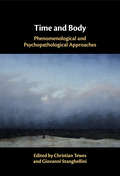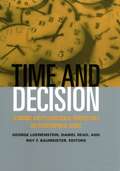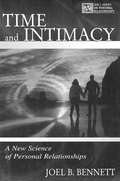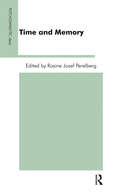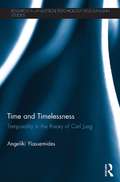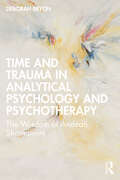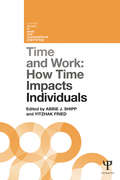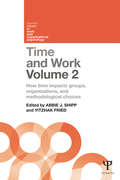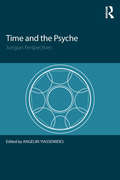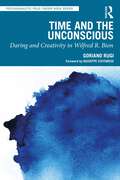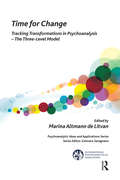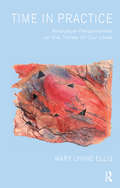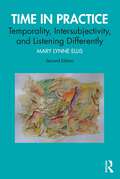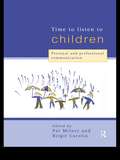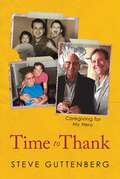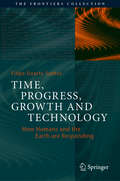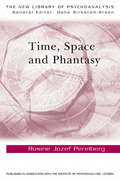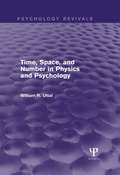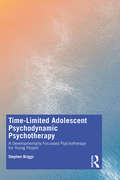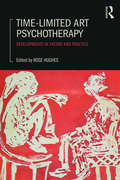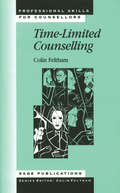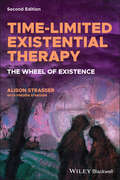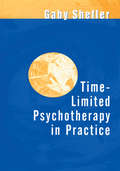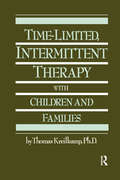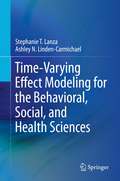- Table View
- List View
Time and Body: Phenomenological and Psychopathological Approaches
by Giovanni Stanghellini Christian TewesTime and Body promotes the application of phenomenological psychopathology and embodied research to a broad spectrum of mental disorders. In a new and practical way, it integrates the latest research on the temporal and intersubjective constitution of the body, self and its mental disorders from phenomenological, embodied and interdisciplinary research perspectives. The authors investigate how temporal processes apply to the contribution of embodiment and selfhood, as well as to their destabilization, such as in eating disorders and borderline personality disorders, schizophrenia, depression, social anxiety or dementia. The chapters demonstrate the applicability of phenomenological psychopathology to a range of illnesses and its relevance to treatment and clinical practice.
Time and Decision: Economic and Psychological Perspectives of Intertemporal Choice
by Roy F. Baumeister George Loewenstein Daniel ReadHow do people decide whether to sacrifice now for a future reward or to enjoy themselves in the present? Do the future gains of putting money in a pension fund outweigh going to Hawaii for New Year's Eve? Why does a person's self-discipline one day often give way to impulsive behavior the next? Time and Decision takes up these questions with a comprehensive collection of new research on intertemporal choice, examining how people face the problem of deciding over time. Economists approach intertemporal choice by means of a model in which people discount the value of future events at a constant rate. A vacation two years from now is worth less to most people than a vacation next week. Psychologists, on the other hand, have focused on the cognitive and emotional underpinnings of intertemporal choice. Time and Decision draws from both disciplinary approaches to provide a comprehensive picture of the various layers of choice involved. Shane Frederick, George Loewenstein, and Ted O'Donoghue introduce the volume with an overview of the research on time discounting and focus on how people actually discount the future compared to the standard economic model. Alex Kacelnik discusses the crucial role that the ability to delay gratification must have played in evolution. Walter Mischel and colleagues review classic research showing that four year olds who are able to delay gratification subsequently grow up to perform better in college than their counterparts who chose instant gratification. The book also delves into the neurobiology of patience, examining the brain structures involved in the ability to withstand an impulse. Turning to the issue of self-control, Klaus Wertenbroch examines the relationship between consumption and available resources, showing, for example, how a high credit limit can lead people to overspend. Ted O'Donoghue and Matthew Rabin show how people's awareness of their self-control problems affects their decision-making. The final section of the book examines intertemporal choice with regard to health, drug addiction, dieting, marketing, savings, and public policy. All of us make important decisions every day-many of which profoundly affect the quality of our lives. Time and Decision provides a fascinating look at the complex factors involved in how and why we make our choices, so many of them short-sighted, and helps us understand more precisely this crucial human frailty.
Time and Intimacy: A New Science of Personal Relationships (LEA's Series on Personal Relationships)
by Joel B. BennettThere is a mysterious connection between our experiences of intimacy--of love, the longing to feel connected, and sexual embrace--and the human sense of time--eternity, impermanence, and rhythm. In this critical analysis of the time-intimacy equation, Bennett shows how the scientific study of personal relationships can address this mystery. As a study of transpersonal science, this book points to the possible evolution of intimacy and of our consciousness of time, and how the two evolutionary paths weave together. Dr. Bennett draws from a wide array of resources to advance and marry two compelling themes: first, the social and clinical science of personal relationships should integrate the spiritual or transpersonal dimension of intimacy, and second, science can contribute to lay understandings by describing the richly temporal aspects of relationships. In blending popular literature, transpersonal psychology, and scientific research and theory, this work also attempts to address the lack of dialogue between academics who study personal intimacy and those writers in the popular press who give advice and guidelines for building intimacy. Time and Intimacy is written for a broad audience, intended for those with a general interest in relationships, as well as for students, counselors, and psychologists. It can be used as a text in courses on personal relationships, as well as to supplement courses in humanistic psychology, transpersonal psychology, interpersonal communication, relationships, marital and family counseling, human relations, and related areas. Because it advances an interdisciplinary understanding of personal relationships, this book is certain to challenge prevailing views about the meaning of intimacy in both the academic and popular literatures.
Time and Memory (Psychoanalytic Ideas Ser.)
by Paul Williams Rosine Jozef Perelberg Inge WiseThe concern with time permeates Freud's work, from Studies on Hysteria to Analysis Terminable and Interminable, which point out to a network of concepts that indicate Freud's complex theories on temporality. Indeed no other psychoanalytic thinker has put forward such revolutionary vision on the dimensions of time in human existence. This volume brings together some of the most important papers written on the topic by members of the British Psychoanalytical Society. In the richness of the detailed clinical discussions the ways in which patients deal with time and memory are viewed as crucial indications about their internal world and ways of relating to their objects. Disorientation regarding time tends to reflect levels of disruption to internal object relationships, inability to mourn or to experience guilt. Examples from literature and history are considered in order to examine the power of the repetition compulsion - Nachtreglichkeit - as well as how the impossibility of bearing the mental pain can lead to the creation of a timeless world.
Time and Timelessness: Temporality in the theory of Carl Jung (Research in Analytical Psychology and Jungian Studies)
by Angeliki YiassemidesTime and Timelessness examines the development of Jung's understanding of time throughout his opus, and the ways in which this concept has affected key elements of his work. In this book Yiassemides suggests that temporality plays an important role in many of Jung's central ideas, and is closely interlinked with his overall approach to the psyche and the cosmos at large. Jung proposed a profound truth: that time is relative at large. To appreciate the whole of our experience we must reach beyond causality and temporal linearity, to develop an approach that allows for multidimensional and synchronistic experiences. Jung’s understanding surpassed Freud's dichotomous approach which restricted timelessness to the unconscious; his time theory allows us to reach beyond the everyday time-bound world into a greater realm, rich with meaning and connection. Included in the book: -Jung’s time theory -the death of time -time and spatial metaphors -the role of time in precognition, telepathy and synchronicity -Unus mundus and time -a comparison of Freud’s and Jung’s time theories: temporal directionality, dimensionality, and the role of timelessness. This book is the first to explore time and timelessness in a systematic manner from a Jungian perspective, and the first to investigate how the concept of time affected the overall development of Jung's theory. It will be key reading for psychoanalytic scholars and clinicians, as well as those working in the field of phenomenological philosophy.
Time and Trauma in Analytical Psychology and Psychotherapy: The Wisdom of Andean Shamanism
by Deborah BryonThis book explores the experience of time in psychoanalysis and Andean shamanism. It plots ways to work through unresolved trauma by expanding how we conceptualize both implicit and nonverbal atemporal experience, drawing from the rituals, narratives, and medicine of Andean shamans and quantum theory.Shifting between subjective states in time is fundamental in trauma work and psychoanalysis. Integrating traumatic experiences that have become split off and held in “timeless” unconscious states of implicit memory is an essential aspect of psychic healing. Becoming familiar with the Andean shamans’ understanding of atemporal experience, as well as learning about their ways of “grounding” the experience consciously, can offer a route through which psychoanalysis and therapy may deepen the therapeutic process and open new states of consciousness. Theories developed in quantum physics are included to parallel the shamans’ experience and for describing the analytic process.Written by a noted expert in this field, this insightful volume will interest trainee and practitioner analytical psychologists, as well as any professional interested in the resolution of trauma within a psychotherapeutic setting.
Time and Work, Volume 1: How time impacts individuals
by Abbie J. Shipp Yitzhak FriedThe concept of time is a crucial filter through which we understand any events or phenomena; nothing exists outside of time. It conditions not only the question of ‘when’, but also influences the ‘what, how and why’ of our ideas about management. And yet management scholars have rarely considered this ‘temporal lens’ in understanding how time affects employees at work, or the organizations for which they work. This 2-volume set provides a fresh, temporal perspective on some of the most important and thriving areas in management research today. Volume 1 considers how time impacts the individual, and includes chapters on identity, emotion, motivation, stress and creativity. Volume 2 considers time in context with the organization, exploring a temporal understanding of leadership, HRM, entrepreneurship, teams and cross-cultural issues. There is an overall concern with the practical implications of understanding individuals and organizations within the most relevant timeframes, while the two volumes provide an actionable research agenda for the future. This is a highly significant contribution to management theory and research, and will be important reading for all students and researchers of Organizational Behavior, Organizational Psychology, Occupational Psychology, Business and Management and HRM.
Time and Work, Volume 2: How time impacts groups, organizations and methodological choices
by Abbie J. Shipp Yitzhak FriedThe concept of time is a crucial filter through which we understand any events or phenomena; nothing exists outside of time. It conditions not only the question of ‘when’, but also influences the ‘what, how and why’of our ideas about management. And yet management scholars have rarely considered this ‘temporal lens’ in understanding how time affects employees at work, or the organizations for which they work. This 2-volume set provides a fresh, temporal perspective on some of the most important and thriving areas in management research today. Volume 1 considers how time impacts the individual, and includes chapters on identity, emotion, motivation, stress and creativity. Volume 2 considers time in context with the organization, exploring a temporal understanding of leadership, HRM, entrepreneurship, teams and cross-cultural issues. There is an overall concern with the practical implications of understanding individuals and organizations within the most relevant timeframes, while the two volumes provide an actionable research agenda for the future. This is a highly significant contribution to management theory and research, and will be important reading for all students and researchers of Organizational Behavior, Organizational Psychology, Occupational Psychology, Business and Management and HRM.
Time and the Psyche: Jungian Perspectives
by Angeliki YiassemidesIn Time and the Psyche, a diverse selection of contributors explores the multi-layered aspects of time through the lens of analytical psychology. The book aims to bridge the gap between theory and practice, emphasising time's fundamental role in the workings and expressions of the psyche, and additionally exploring cultural and clinical dimensions. The contributors deal with temporality in our inner world and its manifestations as expressed by products of our psyche, covering topics including disturbances of temporality within the psychoanalytic session, the acausal connecting principle of synchronicity, time as expressed in film, objects, literature, and culture, and temporality as understood in various types of dreams and imaginary practices. The book also explores the time-bound world, time versus timelessness, the realm of the eternal, human versus cosmic time, Chronos versus Kairos and other temporality-related dimensions and their relationship to our psyche and our experience in the world. With contributors from backgrounds in clinical work, the arts, literature, and philosophy, this collection is unique in its scope. Time and the Psyche is a thought-provoking reading for academics and students of Jungian and post-Jungian studies, analytical psychologists and Jungian analysts in practice and in training.
Time and the Unconscious: Daring and Creativity in Wilfred R. Bion (Psychoanalytic Field Theory Book Series)
by Goriano RugiBion’s unfashionable thought is a challenge for our times in which anaesthesia and mass thinking prevail. The themes this book addresses are time and the unconscious.In the present/past, the here and now reveals its relationship with the unredeemable time, which conditions our behaviour and is at the root of a state of hallucinosis in the form of a short-sighted view that is distorted by deep-seated wounds. This book also highlights the resonances with contemporary epistemology and physics that underlie the new paradigm of psychoanalytic field theory. The topic of the unconscious raises questions about its origin and the difference between the Bionian and the Freudian unconscious. In Bion we see an evolutionary, process character emerge, with a double movement of repetition and expansion within a single system in unstable equilibrium, for which there is no conscious feeling that does not also carry with it the shadow of the unconscious.Drawing on psychoanalytic and philosophical concepts this book is essential reading for psychoanalysts, psychotherapists, philosophers and anyone who wishes to understand more fully what it means to be human.
Time for Change: Tracking Transformations in Psychoanalysis - The Three-Level Model (The International Psychoanalytical Association Psychoanalytic Ideas and Applications Series)
by Marina Altmann de LitvanThis book presents a research work on transformations in psychoanalysis and clinical observation of changes in psychoanalysis. It compares, based on the "three-level model", the different points of view of psychoanalysts from all over the world and from different psychoanalytical cultures.
Time in Practice: Analytical Perspectives on the Times of Our Lives
by Mary Lynne EllisThis book is an original exploration of the importance in the analytical relationship of an attentiveness to lived, conscious and unconscious experiences of time in its three dimensions. It critically discusses the diverse concepts of time implied in different writings in the psychoanalytic tradition, namely those of Freud, Jung, Klein, Lacan, and Winnicott. "Time in Practice" highlights the limitations of spatial metaphors and the emphasis on the past as determinative. It discusses the contributions of modern European philosophical concepts of temporality. Eva Hoffman's interweaving of time and language in her autobiographical descriptions is shown to be crucially relevant to psychoanalytic practices. Exploring psychoanalytic notions of 'cure', the book emphasizes the importance of language and imagination in opening out future possibilities for the patient. Lively references to case material illustrate the relevance of its arguments.
Time in Practice: Temporality, Intersubjectivity, and Listening Differently
by Mary Lynne EllisTime in Practice: Temporality, Intersubjectivity, and Listening Differently is an original exploration of diverse ways in which individuals ‘live’ time, consciously and unconsciously. Challenging the psychoanalytic emphasis on the past as determinative, Mary Lynne Ellis explores the significance of present and future dimensions of individuals’ experiences which catalyses change in the analytical relationship. Through critical analyses of the theorizing of Freud, Jung, Klein, Winnicott, and Lacan, Ellis highlights the limitations of spatial metaphors, binaries of ‘inner’/‘outer’, in addressing the socio-political and historical specificity of patients’ experiences, including questions of identity and discrimination. She explores how intersectional and interdisciplinary perspectives allow for the development of new interpretations of temporality/intersubjectivity/language/embodiment in analytical practices. Ellis reflects on the dynamism of conceptualizations emergent in autobiography, fiction, phenomenological and postmodern philosophy, gender, post-colonial, queer, and cultural studies, for contemporary relational psychoanalytic practices. This revised and updated edition includes discussion of experiences of loss, vulnerability, mortality, inequalities, and powerlessness associated with the profound impact of the spread of the coronavirus, climate change, and the Ukraine war. It also includes a new chapter on mourning, time, and identities. The book will be of interest to psychotherapists, art therapists, counsellors, psychologists, and those working in the fields of gender, sexuality, class, race, and post-colonial studies, literature, and allied disciplines.
Time to Listen to Children: Personal and Professional Communication
by Pat Milner Birgit CarolinTime to Listen to Children is a practical guide to effective communication with children. Professionals working with children in a variety of settings examine the skills required to help children articulate their problems and feelings. They discuss issues such as training, cultural background and religion and give accounts of their work in the following settings: * education * social services * voluntary organizations * medical settings * law Contributors practice a variety of therapeutic techniques, including play, music and art therapy. Time to Listen to Children will be a valuable resource for social workers, teachers and counsellors in training and for all professionals who wish to adopt a skilled, reflective and active approach to their work with children.
Time to Thank: Caregiving for My Hero
by Steve GuttenbergAfter his father—the hero and strength of the family—is diagnosed with kidney failure, actor Steve Guttenberg dedicates himself to becoming a caregiver and reflects on their life together, from childhood through his Hollywood career, in his father&’s final years.Since moving to Hollywood at age seventeen, Steve Guttenberg has delighted and moved audiences with his film and television work. But when his father is diagnosed with kidney failure, Steve has to step into a new and wholly unexpected role: caretaker. In Time to Thank, Steve tracks his weekly road trips from Los Angeles to Arizona to care for his father and the ways in which his time on the road affords him the perspective to reflect on his life.Through the prism of his relationship with his father, Steve recounts his early life in Queens and Long Island; his early career as a rising Hollywood star, trying to find his way with the encouragement of his parents; and the painful and moving work of helping care for an ailing family member at the end of their life. From glamorous Hollywood parties and film sets around the world to the daily process of dialysis in suburban Phoenix, Steve offers his wit, empathy, and signature charm.This is a book for movie fans, road trip junkies, and anyone who finds themselves doing the hard work of caring for an aging loved one. Steve Guttenberg serves as a uniquely perceptive guide through all these phases of life, with a story that is certain to touch readers and make sure they know that they&’re not alone.
Time, Progress, Growth and Technology: How Humans and the Earth are Responding (The Frontiers Collection)
by Filipe Duarte SantosThis book addresses the current challenges of sustainable development, including its social, economic and environmental components. The author argues that we need to develop a new concept of time based on inter-generational solidarity, which focuses both on the long- and the short term. The evolution of man's notions of time are analyzed from prehistory to modern times, showing how these concepts shape our worldviews, our ecological paradigms and our equilibrium with our planet. Practical approaches to dealing with the major medium- and long term sustainability challenges of the 21st century are presented and discussed. This is a thought provoking and timely book that addresses the main global socioeconomic and environmental challenges facing the current and future generations, using science-based analysis and perspectives. It presents an historical narrative of the advent of progress, economic growth and technology, and discusses the structural changes needed to co-create sustainable pathways. It provides hope for our future on Earth, mankind’s common home. António Guterres, Secretary-General of the United Nations This is an amazing, almost mind-boggling book. The author takes a look at the true whole, i.e., the development of the human enterprise since its very beginning. This enterprise is evidently a possibility under the boundary conditions of cosmological dynamics and natural evolution, but evidently also a highly improbable one. It is all but a miracle that the Earth system in its present form exists and happens to support a technical civilization. Will this civilization last long, will it transform itself into something even more exceptional, or will it perish in disgrace?Santos dares to address these grandest of all questions, equipped with a unique transdisciplinary wisdom drawing on physics, cybernetics, geology, biology, economics, anthropology, history, and philosophy. And he dares to dive into the deepest abysses of thinking, where categorial monsters like time and progress lurk. Thereby, he takes us on fascinating journey, during which we perceive and grasp things we have never seen and understood before. One of the best essays I have ever read. John Schellnhuber, founding director of the Potsdam Institute for Climate Impact Research (PIK) and former chair of the German Advisory Council on Global Change
Time, Space and Phantasy (The New Library of Psychoanalysis)
by Rosine Jozef PerelbergTime, Space, and Phantasy examines the connections between time, space, phantasy and sexuality in clinical practice. It explores the subtleties of the encounter between patient and analyst, addressing how aspects of the patient’s unconscious past are actualised in the present, producing new meanings that can be re-translated to the past. Perelberg’s analysis of Freud’s Multi-dimensional model of temporality suggests that he always viewed the constitution of the individual as non-linear. In Freud’s formulations, the individual is decentred and ruled by different temporalities, most of which escape their consciousness. Perelberg identifies the similarities between this and Einstein’s theory of relativity which states that rather than being absolute, time depends on the relative position and speed of the observing individual suggesting that rather than being a reality, time is an abstraction, connecting objects and events. Throughout this text, Perelberg draws together connections between time, mental space, and phantasy showing how time is constantly reshaped in the light of new events and experiences. This book will be of interest to psychoanalysts, psychotherapists, psychologists, and social workers.
Time, Space, and Number in Physics and Psychology (Psychology Revivals)
by William R. UttalThe crux of the debate between proponents of behavioral psychology and cognitive psychology focuses on the issue of accessibility. Cognitivists believe that mental mechanisms and processes are accessible, and that their inner workings can be inferred from experimental observations of behavior. Behaviorists, on the contrary, believe that mental processes and mechanisms are inaccessible, and that nothing important about them can be inferred from even the most cleverly designed empirical studies. One argument that is repeatedly raised by cognitivists is that even though mental processes are not directly accessible, this should not be a barrier to unravelling the nature of the inner mental processes and mechanisms. Inference works for other sciences, such as physics, so why not psychology? If physics can work so successfully with their kind of inaccessibility to make enormous theoretical progress, then why not psychology? As with most previous psychological debates, there is no "killer argument" that can provide an unambiguous resolution. In its absence, author William Uttal explores the differing properties of physical and psychological time, space, and mathematics before coming to the conclusion that there are major discrepancies between the properties of the respective subject matters that make the analogy of comparable inaccessibilities a false one. This title was first published in 2008.
Time-Limited Adolescent Psychodynamic Psychotherapy: A Developmentally Focussed Psychotherapy for Young People
by Stephen BriggsTime-Limited Adolescent Psychodynamic Psychotherapy: A Developmentally Focussed Psychotherapy for Young People will be an indispensable clinician’s guide to the practice of Time-Limited Adolescent Psychodynamic Psychotherapy (TAPP), providing comprehensive instruction on the theory and delivery of this distinctive model of psychotherapy. TAPP is a manualised brief psychodynamic psychotherapy of 20 sessions, for young people between, approximately, 14 and 25 years, combining psychodynamic psychotherapy with psychosocial understanding of adolescent difficulties. It places emphasis on the therapeutic engagement of young people and works with a developmental focus to effect change and growth. Divided into two parts, "Conceptual Framework" and "Practice", this book combines digestible scholarly analysis with case studies to effect a one-stop practitioner’s guide to TAPP. Time-Limited Adolescent Psychodynamic Psychotherapy: A Developmentally Focussed Psychotherapy for Young People will be of immense value to clinicians working with young people, researchers engaging with evaluating TAPP and students of psychotherapy.
Time-Limited Art Psychotherapy: Developments in Theory and Practice (Youth, Young Adulthood and Society)
by Rose HughesTime-limited Art Psychotherapy: Developments in Theory and Practice comes at a watershed in the provision of art psychotherapy in public services. The increase in 'payment by results', clinical throughput and evidence-based practice, as well as the changing NHS context means there is an increasing need to provide effective therapeutic treatments within brief time limits where appropriate. The book brings together the developments in theory and practice in time-limited working strategies emerging in the field. The contributors, all practising therapists, examine the practice of time-limited art therapy with different clients in a range of settings, with a variety of approaches, showing how they react and adapt to the changing face of mental health services. Time-limited Art Psychotherapy will be essential reading to trainers and trainees in art psychotherapy and other schools of psychotherapy who integrate creative approaches within their practice. It will also form a useful contribution to the continuing professional development for a range of psychological therapists and practitioners of integrated psychotherapies such as CAT and mentalisation based therapies amongst others.
Time-Limited Counselling (Professional Skills for Counsellors Series #1)
by Colin Feltham`Excellent... [the book] explores the "provision of effective counselling with limited resources and under strict time pressures"... with some excellent writing on the nature of time and attitudes to time in counselling and psychotherapy... the evidence in favour [of short-term counselling] is put strongly. Colin Feltham favours it as an approach of choice for certain clients, which should co-exist with (rather than adversarially seek to oust and replace) longer-term therapy... he draws from a wide range of literature, while identifying those key ingredients, skills and strategies that he has found especially significant. He also discusses some of the different contexts in which this work operates... Many of the questions and issues he poses... will be picked up most productively in training and supervision sessions' - Counselling, The Journal of the British Association for Counselling and Psychotherapy Time-limited counselling - that is, the provision of effective counselling with limited resources and under strict time pressures - is becoming increasingly important as the demand for counselling increases, and the management of waiting lists and costs becomes a crucial concern. In this clearly written book, which incorporates useful, illustrative examples, Colin Feltham outlines the specific practical and technical skills, strategies and knowledge counsellors must have in order to undertake time-limited counselling. Following an examination of the client's induction into counselling, he describes the most appropriate models for different clients and problems. Further chapters assess the management of time-limited counselling in different settings - including private practice - and look at research, training and supervision issues. Squarely addressing the objections to the use of, and real problems in, the practice of this short-term therapeutic paradigm, the author argues that time-limited counselling can be justified not only on economic grounds but also ethically, philosophically, clinically and with reference to consumer preferences. He also identifies the common factors in successful short-term work that span different theoretical orientations.
Time-Limited Existential Therapy: The Wheel of Existence
by Alison StrasserExplore the concept of time as it applies to the therapeutic setting Following the innovative first edition which she co-authored with her late father, Freddie Strasser, in the newly revised Second Edition of Time-Limited Existential Therapy: The Wheel of Existence, distinguished therapist Alison Strasser delivers an insightful aid to integrating and working with existential givens as they arise within a therapeutic encounter. She locates the concept of Time as central to all therapies, regardless of their theoretical modality, and demonstrates how it can be used in brief, short-term, and open-ended therapies. The book relies on the concept of The Wheel to provide a framework for understanding existential and phenomenological philosophies and to help readers put them into practice with clients. It includes meaningful case vignettes that bring existential themes to life and is accessible to both therapists and interested lay members of the public. Finally, the author highlights how our experience with COVID-19 has impacted, and been impacted by, the existential themes we all deal with on a regular basis. A thorough overview of a commonsense existential approach and a discussion of the mystery of time Practical discussions of the limitations and possibilities of time-limited existential therapies, as well as concepts and methods in the area. Comprehensive explorations of the tyranny of high morality, and examinations of the body, the "givents" and "connectedness". Time-Limited Existential Therapy: The Wheel of Existence is an indispensable resource for experienced psychotherapists, counsellors, social workers, coaches, and psychologists, as well as trainees in these fields seeking a common-sense approach to existential ideas in the context of therapy.
Time-Limited Psychotherapy in Practice
by Gaby SheflerTherapists and counsellors are under increasing pressure to provide effective treatment in a time-limited, demonstrably effective form. Time-Limited Psychotherapy (TLP) has developed in response, and is designed to give clients an intense form of therapy over 12 sessions. This title: * Uses vivid clinical descriptions of treatments and up-to-date research findings * Describes what the treatments entail * Discusses their outcome * Deals with teaching and learning of TLP regarding the changing conditions in public needs and in public services. Time-Limited Psychotherapy in Practice will appeal to psychotherapists, counsellors, researchers and academics in the mental health field.
Time-Limited, Intermittent Therapy With Children And Families
by Thomas KreilkampThis book describes an approach to short-term therapy with children and families that has been developed at a health maintenance organization, the Harvard Community Health Plan (HCHP). First published in 1989. Routledge is an imprint of Taylor & Francis, an informa company.
Time-Varying Effect Modeling for the Behavioral, Social, and Health Sciences
by Stephanie T. Lanza Ashley N. Linden-CarmichaelThis book is the first to introduce applied behavioral, social, and health sciences researchers to a new analytic method, the time-varying effect model (TVEM). It details how TVEM may be used to advance research on developmental and dynamic processes by examining how associations between variables change across time. The book describes how TVEM is a direct and intuitive extension of standard linear regression; whereas standard linear regression coefficients are static estimates that do not change with time, TVEM coefficients are allowed to change as continuous functions of real time, including developmental age, historical time, time of day, days since an event, and so forth.The book introduces readers to new research questions that can be addressed by applying TVEM in their research. Readers gain the practical skills necessary for specifying a wide variety of time-varying effect models, including those with continuous, binary, and count outcomes. The book presents technical details of TVEM estimation and three novel empirical studies focused on developmental questions using TVEM to estimate age-varying effects, historical shifts in behavior and attitudes, and real-time changes across days relative to an event. The volume provides a walkthrough of the process for conducting each of these studies, presenting decisions that were made, and offering sufficient detail so that readers may embark on similar studies in their own research. The book concludes with comments about additional uses of TVEM in applied research as well as software considerations and future directions. Throughout the book, proper interpretation of the output provided by TVEM is emphasized.Time-Varying Effect Modeling for the Behavioral, Social, and Health Sciences is an essential resource for researchers, clinicians/practitioners as well as graduate students in developmental psychology, public health, statistics and methodology for the social, behavioral, developmental, and public health sciences.
